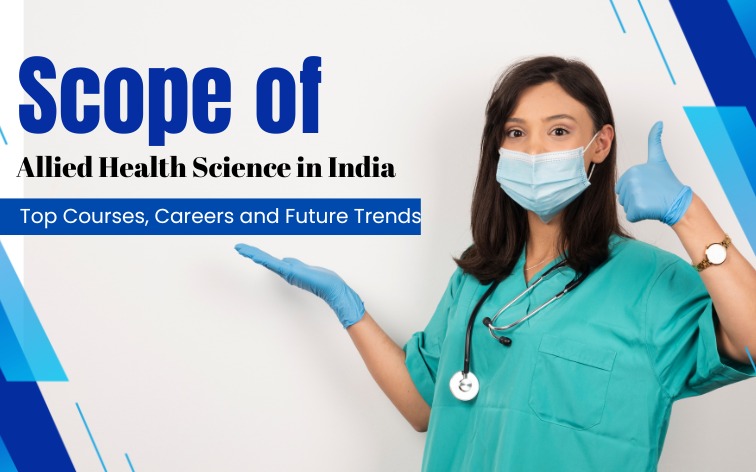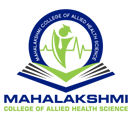
Allied Health Science is rapidly evolving and plays a critical role in the Indian medical system. Candidates who are interested in the medical field, but don’t want to pursue MBBS, can choose this program. The scope of allied health in India is increasing because of the advancements in medical technology, large number of healthcare facilities and growing population. These professionals provide medical support services helping the doctors and surgeons in diagnosis, treatment and patient care, rather than direct patient treatment. They are actively recruited from Hospitals, diagnostic centers, rehabilitation clinics, and research institutions. In this article, we are providing complete information regarding the scope of Allied Health Science in India. We are recognized as a Best Allied Health Science College in India because of our comprehensive programs, experienced faculties and impeccable teaching and training. As we are constantly seeking the future trends, students who are coming out of our college can be bloomed into excellent allied health science professionals.
What is Allied Health Science?
Allied Health Science is a specialized discipline in healthcare, focused on providing a wide range of medical support services. These healthcare professionals help the doctors and surgeons in diagnosis, treatment and patient care on various chronic and acute medical conditions. It is related to specialized medical fields such as laboratory technology, radiology, physiotherapy, optometry, etc. It combines medicine, science, health and behavioural science to promote the patient’s well-being and to serve well in the healthcare system. In short, they assist fellow healthcare professionals to cure the patients effectively and help for speedy recovery.
Why Allied Health Science is Popular in India?
During COVID-19 Pandemic, the critical shortage of healthcare professionals was clearly found, which highlighted the scope of allied health science in India. As per the recent study by NATHEALTH conducted along with Boston Consulting Group, it is found that India has an unfulfilled demand of 30-40% of allied health science professionals. This highlights the critical need for these professionals to improve the Indian healthcare system. Growing healthcare awareness among people and advancements in medical technologies also stressed the demand for qualified allied health science professionals. Contrary to traditional medical degree, it can be completed in minimum duration and can provide maximum healthcare service for the people.
Learn more: Reasons to choose allied health science course
Top Allied Health Science Courses in India
Choosing the allied health science course based on your interests and expertise can be rewardable in the long-term. Below, we have listed some of the top allied health science courses in India, along with descriptions:
- Cardiac Technology: Uses technology to diagnose or treat the heart and cardiovascular conditions.
- Medical Laboratory Technology: Perform critical diagnostic tests that drive medical decisions.
- Radiology and Medical Imaging Technology: Capture and interpret images to reveal internal health conditions.
- Physiotherapy: Restore movement and physical function through targeted therapy.
- Occupational Therapy: Help individuals regain independence in daily life activities.
- Optometry: Specialize in eye care, vision correction, and ocular health.
- BSc Allied Health Sciences: A multidisciplinary foundation for diverse healthcare careers.
- Respiratory Therapy: Manage and treat patients with acute and chronic breathing disorders.
- Speech-Language Pathology: Diagnose and treat communication and swallowing disorders.
- Audiology: Assess and treat hearing and balance disorders across all age groups.
- Anesthesia Technology: Support safe and effective delivery of anesthesia in medical settings.
- Operation Theater Technology: Assist in surgical procedures with precision and sterile technique.
- Dialysis Technology: Operate life-saving dialysis equipment for patients with kidney failure.
- Dialysis Technology: Operate life-saving dialysis equipment for patients with kidney failure.
- Prosthetics and Orthotics: Design and fit artificial limbs and supportive devices for mobility.
- Medical Coding and Health Information Management: Organize and manage medical data for efficient healthcare delivery.
- Nuclear Medicine Technology: Use radioactive materials for advanced diagnosis and treatment.
- Emergency and Trauma Care: Deliver rapid, life-saving care in critical emergency situations.
This list of courses emphasizes the scope of allied health science in India. Choosing the right course and focusing on the right career is important for the career growth of these professionals.
Also read: Top Allied Health Science Courses to Pursue in 2025
Career Options in Allied Health Science Field
Allied health science students and graduates have a variety of rewarding career options in the field. Let’s explore few:
- Dietitian/Nutritionist: Develop personalized diet plans to promote health and manage medical conditions.
- Audiologist: Diagnose and treat hearing and balance disorders across all age groups.
- Physician Assistant: Provide medical care under a physician’s supervision, including exams, treatments, and minor procedures.
- Physical Therapy Assistant: Support physical therapists in helping patients recover movement and strength.
- Occupational Therapist: Assist individuals in regaining the skills needed for daily living and work activities.
- Medical Laboratory Technologist: Perform lab tests on samples to aid in the diagnosis and treatment of diseases.
- Radiologic Technologist: Operate imaging equipment to help diagnose injuries and medical conditions.
- Respiratory Therapist: Treat patients with breathing or cardiopulmonary disorders using specialized techniques and equipment.
- Optometrist: Examine eyes, diagnose vision problems, and prescribe corrective lenses or treatment.
- Anesthesia Technologist: Assist anesthesiologists by preparing and managing equipment and monitoring patients during procedures.
- Medical Coder: Translate medical diagnoses and procedures into standardized codes for billing and records.
- Prosthetic and Orthotic Technician: Design, build, and fit artificial limbs and supportive devices for patients with physical impairments.
Career Pathway of Allied Health Science Professionals
For Allied health science professionals, multiple pathways are opened up to build their career. Prospectively, students and graduates must choose the path that suits your nature, interests and needs.
- Entry Level Positions: Start as technicians, assistants, or junior practitioners in hospitals, clinics, and healthcare facilities
- Specialization Development: Pursue advanced certifications and specialized training in chosen fields
- Clinical Leadership Roles: Progress to senior technologist, supervisor, or department head positions
- Academic and Research Careers: Move into teaching positions at medical colleges and research institutions
- Administrative Management: Advance to healthcare administration, quality assurance, and facility management roles
- Entrepreneurial Opportunities: Establish private practice clinics, diagnostic centers, or healthcare consulting services
- Industry Partnerships: Work with medical device companies, pharmaceutical firms, and healthcare technology organizations
- Continuing Education Pathways: Pursue master's degrees, doctoral programs, and professional development courses
- Cross-Specialization: Expand expertise across multiple Allied Health disciplines for enhanced career flexibility
Future Trends of Allied Health Science in India
The future of Allied health science in India looks promising because of the emerging trends. As technological revolution is perceived, where healthcare science integrates with artificial intelligence, telemedicine and digital health platforms creates new opportunities for allied health science professionals. Since many healthcare services are yielding, like rehabilitation services, homecare, wellness programs, health programs and community outreach initiatives, the demand for allied health science professionals are growing. These increased innovations and services require professionals who provide assistance, that’s where allied health science specialists are called up.
Conclusion
Allied Health Science is emerging as a cornerstone of India’s evolving healthcare system, offering diverse and in-demand career opportunities for those passionate about medical service beyond the MBBS route. With rapid advancements in technology, growing healthcare needs, and a significant shortage of skilled professionals, the field presents a promising future for students seeking impactful roles in diagnosis, treatment support, and patient care. As the healthcare sector continues to expand and innovate, Allied Health Science professionals will play a vital role in shaping accessible, efficient, and quality healthcare across the nation.
Related Resources
FAQs on Scope of Allied Health Science in India
Salaries vary by specialization and experience, typically ranging from ₹2.5 LPA to ₹6 LPA at entry level, with higher earnings in private sectors, urban hospitals, and advanced roles.



